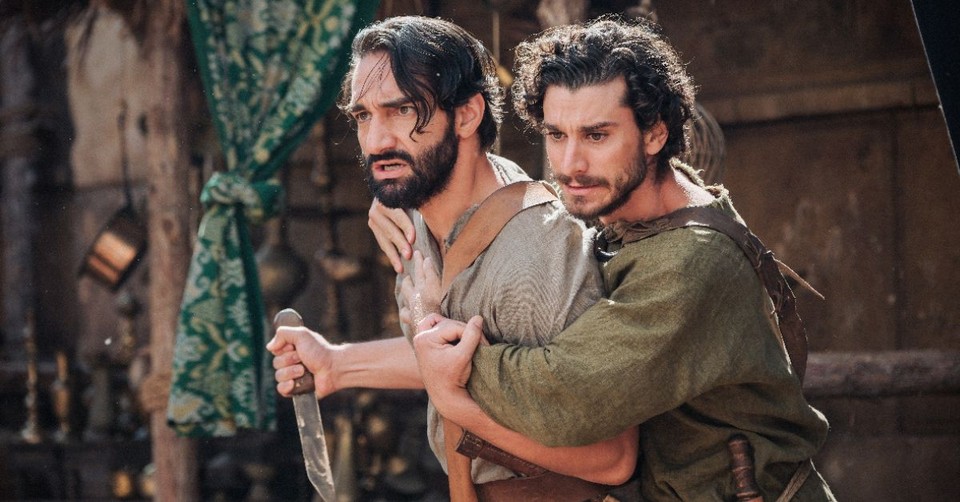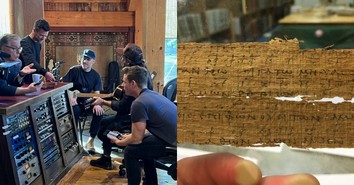Controversial Scene from The Chosen Season 4 Sparks Debate

The creator and director of the Bible-based hit series The Chosen on Thursday addressed a plot-twisting cliffhanger scene from Season 4, episode 3 that surprised many viewers and ignited a debate among fans, some of whom said they shed tears watching it and others who said they were troubled by how it ended.
(Warning: Spoilers ahead.)
Season 4, episodes 1-3 of The Chosen opened in theaters on Feb. 1 and will be followed by episodes 4-6 debuting in theaters on Feb. 15, and episodes 7-8 on Feb. 29. It is the first time an entire season of a television series has been released in theaters on a wide scale.
The new season includes several of the most well-known scenes from Scripture, including the raising of Lazarus, the death of John the Baptist, and Jesus telling the disciples, “Upon this rock I will build my church.” Simon’s name is changed to “Peter” in Season 4. Additionally, the Romans begin to conspire against Jesus by joining the religious leaders.
But a scene at the end of episode 3 shocked many viewers. In the final moments of the episode -- and in the final minutes of the theatrical film -- a Roman official named Quintus grows angry at his inability to capture Jesus in a large crowd and begins swinging a sword. In his anger, Quintus stabs Ramah, the on-screen fiance of the apostle Thomas. With Ramah lying on the ground bleeding and dying, Quintus leaves the crowd, and Jesus briefly returns to the scene. Ramah’s dying words are to tell Thomas to “stay with” Jesus. Thomas pleads with Jesus to raise her back to life. A tearful Jesus expresses remorse but responds, “It is not her time. I love you, Thomas. He loves you. I’m so sorry.” Soon, the credits appear on the screen.
“The majority of comments that we have gotten have been overwhelmingly positive,” Dallas Jenkins, the series creator and director, said during a live stream.
Jenkins read a comment from a viewer who affirmed the scene and wrote, “My husband told me when our son died that God is sovereign. And I had to look that word up later that day. I read the definition, but I never really got it. I do now. Someday I will see my son again. The first person I want to see is Jesus when it's my turn. Oh my, what an awesome day that will be.”
Other viewers, though, “felt wounded or hurt” or believed the scene “didn't reflect the character of Jesus,” Jenkins said.
“Remember, this is the end of episode 3, but it's not the end of the season. It's not the end of the series -- all of these things are in context,” Jenkins said. “... This is a long game.”
Episode 3 begins with a flashback to the Old Testament, showing King David praying for the health of his young son, who eventually died (2 Samuel 12:16–23). When David learns that the child has died, he walks away silently.
“David pleaded with God, and the baby was lost,” Jenkins said. “... Bathsheba was saying, ‘How can you be okay now? How can you recover from this?’ And [David is] like, ‘I asked, and He said no.’ And she's like, ‘Why does He answer some prayers and not others?’ And [David] says, ‘I've never understood it. But this is faith -- in good or bad I worship.’”
He added, “Part of the whole purpose of the entire show is to reveal a larger biblical truth, capital T.”
Jenkins’ wife, Amanda Jenkins, said of the scene, “The theme of God's sovereignty, the theme of suffering, the theme of loss -- those things are in Scripture.”
Some viewers, they said, were troubled that Jesus declined to raise Raham from the dead. Dallas Jenkins noted that there are three instances of resurrections in the gospels, including Lazarus, but no more.
“That only happened three times in the gospels, and no doubt, must have been hoped for and asked for many other times but wasn't given,” he said.
There are examples in the gospels, Jenkins said, when Jesus chose not to heal.
“There were times when towns wanted Him to come and heal. And He didn't do that,” he said.
The livestream also included a superfan who said she believed Jesus lacked compassion in the scene. Jesus, she said, should have hugged Thomas. Jenkins countered that Thomas, in that moment, likely would not have accepted the hug and would have been angry.
Later in the livestream, Jenkins noted that Jesus, in the same episode, healed a blind man.
Co-writer Tyler Thompson said of Jesus’ words in the scene (“It is not her time”): “I had hoped it would call to mind for people that Jesus says, ‘I am the resurrection and the life. He who believes in Me, though he dies yet shall he live.”
The scene was not written to shock viewers, Jenkins said.
“It was with purpose and intention.”
RELATED PODCAST:
Photo Courtesy: The Chosen
Michael Foust has covered the intersection of faith and news for 20 years. His stories have appeared in Baptist Press, Christianity Today, The Christian Post, the Leaf-Chronicle, the Toronto Star and the Knoxville News-Sentinel.
Listen to Michael's Podcast! He is the host of Crosswalk Talk, a podcast where he talks with Christian movie stars, musicians, directors, and more. Hear how famous Christian figures keep their faith a priority in Hollywood and discover the best Christian movies, books, television, and other entertainment. You can find Crosswalk Talk on LifeAudio.com, or subscribe on Apple or Spotify so you never miss an interview that will be sure to encourage your faith.
Originally published February 09, 2024.





